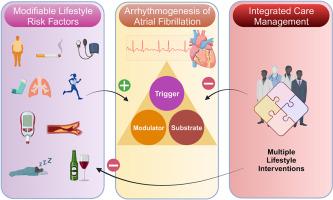生活方式风险因素对心房颤动的影响:机制和预防方法--叙述性综述
IF 1.9
Q3 PERIPHERAL VASCULAR DISEASE
International Journal of Cardiology Cardiovascular Risk and Prevention
Pub Date : 2024-10-24
DOI:10.1016/j.ijcrp.2024.200344
引用次数: 0
摘要
心房颤动(房颤)的发生和发展都受到一系列可改变的生活方式风险因素的影响。这些主要的可改变风险因素包括肥胖、高血压、高胆固醇血症、糖尿病、吸烟、慢性阻塞性肺病、饮酒、运动、久坐不动的生活方式和阻塞性睡眠呼吸暂停。这些依赖于生活方式的因素很少单独存在,而是共同存在,对房颤的发展产生复杂的影响。本综述通过探讨这些生活方式因素在房颤基质形成、调节特性和触发机制中的作用,阐明了它们在房颤心律失常发生过程中的相互作用和相互依存关系。通过讨论针对多种风险因素的治疗策略的有效性,我们强调了有针对性的预防策略的重要性。此外,我们还从改善生活方式的角度讨论了综合护理、护士主导的护理和移动医疗的临床影响。这些管理策略适用于阵发性和持续性房颤,对接受房颤消融术的患者也有好处。尽管生活方式和预防策略面临诸多挑战,但仍有明显的实质性益处,如改善生活质量和提高消融效果。这篇综述进一步强调了适当调整生活方式的重要性,它是心房颤动患者管理的基本支柱。本文章由计算机程序翻译,如有差异,请以英文原文为准。

Impact of lifestyle risk factors on atrial fibrillation: Mechanisms and prevention approaches – A narrative review
Both the development and progression of atrial fibrillation (AF) are affected by a range of modifiable lifestyle risk factors. These key modifiable risk factors encompass obesity, hypertension, hypercholesterolemia, diabetes mellitus, smoking, chronic obstructive pulmonary disease, alcohol consumption, exercise, sedentary lifestyle and obstructive sleep apnoea. These lifestyle-dependent factors rarely exist in isolation, but rather exist together, exerting a complex influence on the development of AF. This comprehensive review elucidates the interplay and interdependency of these lifestyle factors in the arrhythmogenesis of AF, by exploring their role in AF substrate formation, modulating properties and triggering mechanisms. We emphasize the importance of targeted prevention strategies by discussing available literature on the effectiveness of treatment strategies targeting multiple risk factors. Additionally, the clinical impacts of integrated care, nurse-led care and mobile health are discussed in the context of lifestyle improvement. These management strategies have favourable applicability in both paroxysmal and persistent AF, and are also beneficial for patients receiving AF ablation. Despite the challenges accompanying lifestyle and prevention strategies, substantial benefits are apparent, such as improved quality of life and better ablation outcomes. This review further emphasizes the essential nature of awareness of appropriate lifestyle modifications as fundamental pillars in the management of individuals with AF.
求助全文
通过发布文献求助,成功后即可免费获取论文全文。
去求助
来源期刊

International Journal of Cardiology Cardiovascular Risk and Prevention
Cardiology and Cardiovascular Medicine
CiteScore
3.00
自引率
0.00%
发文量
0
审稿时长
72 days
 求助内容:
求助内容: 应助结果提醒方式:
应助结果提醒方式:


